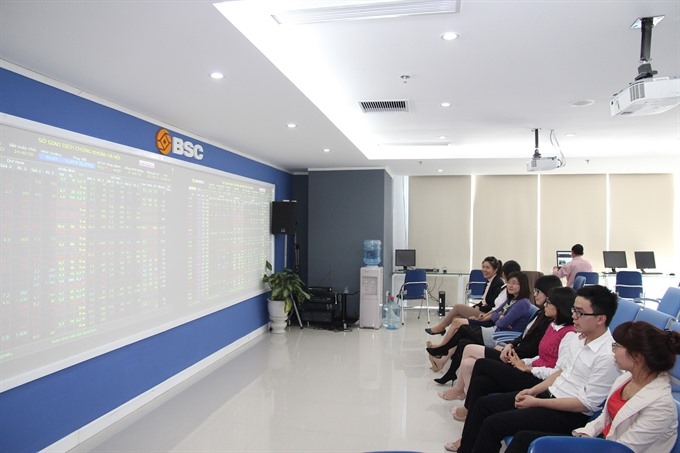 Economy
Economy

Bottom purchase demand helped shares finish last week on a positive note, but a single gaining session does not mean that the market’s downtrend in the past three weeks has stopped, analysts said.
 |
| Investors watch market fluctuations on the trading floor of BIDV Securities. – VNS Photo Trương Vị |
HÀ NỘI — Last week’s share ‘fire sale’ may have ended trading on a positive note, but analysts have warned the single gaining session does not mean the market’s downtrend has stopped.
The benchmark VN-Index on the Hồ Chí Minh Stock Exchange climbed 0.31 per cent to end last week at 880.90 points. It declined 1.3 per cent last week.
A similar scenario was also seen on the northern market. On the Hà Nội Stock Exchange, the HNX-Index gained 0.32 per cent to end last week at 100.85 points. It has decreased 3.25 per cent on a weekly basis.
An average of more than 185 million shares was traded in each session last week on the two exchanges, worth VNĐ3.2 trillion (US$139 million).
The market suffered strong selling pressure last week but positive signs appeared at the weekend as strong bottom fishing demand helped VN-Index end the trading week with a rally.
“Just a rebound session is not enough to deduce that the bearish period of the market in the past three weeks had come to an end. Investors were quite cautious and concerned about the possibility of a market bull trap,” said Trần Minh Hoàng, head of Research & Analysis Department, from Vietcombank Securities (VCBS).
A bull trap is a false signal that indicates a declining trend in a stock or index has reversed and is heading upwards when, in fact, the security will continue to decline.
“Recently it is estimated that in seven out of the past eight years, the VN-Index increased in January. However, the similar trend was not seen in the first three trading sessions of this year,” said Hoàng Thạch Lân, head of the individual investor department at Viet Dragon Securities Co (VDSC).
“Stock indexes are not as seasonal as the normal economic indicators but they reflect expectations or worries of market traders to the momentary information, which, at the current time, includes the risk of world economic recession. I don’t have high expectations in January,” Lân said.
The Vietnamese market is currently influenced by investors’ psychology, which is affected by both domestic and international information.
Foreign investors had been net buyers for seven straight sessions from December 24 last year before slightly net selling last Friday, which indicated they were not as worried as domestic investors, Lân said, adding that the movements of the VN-Index and stock prices in the coming weeks are difficult to forecast and may fluctuate based on the daily movements of major stock indexes from the US and Asian markets, he said.
Trần Minh Hoàng from VCBS said the reason for the market’s rebound in the short term is not really clear. Investor sentiment is still quite cautious. Although bottom fishing has appeared, the demand was still weak and not strong enough to support the market.
“It is likely the indexes will continue to go up and down in the next few weeks before the 2018 business results of listed companies are gradually announced,” Hoàng said.
Châu Thiên Trúc Quỳnh, director and head of local brokerage at Việt Capital Securities, said investors who take risks and prefer short-term trading could start tracking the stocks that were already in their portfolios or stock codes that are forecast to have good business results in 2018 and good fundamentals and positive growth prospects for 2019. — VNS









